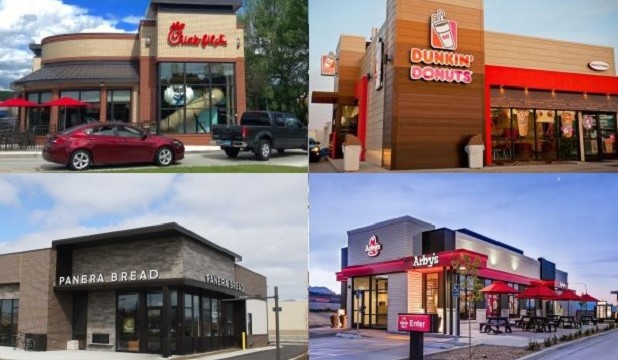 Quick service restaurants provide investors with brands they are familiar with.
Quick service restaurants provide investors with brands they are familiar with.
CHICAGO—E-commerce resistant quick serve restaurants remain a popular investment vehicle as cap rates continue to compress, the “premium” paid for this retail sector increases further, and the 2018 mid-year level of activity was higher than the same period one year ago, according to the 2018 Net Lease QSR Market Report, published by Wilmette, IL-based The Boulder Group.
“This is the sweet spot of where private investors want to be,” Randy Blankstein, president of Boulder, tells GlobeSt.com. “Many worry about where certain sectors are going to be in five or ten years,” but “while e-commerce is rapidly changing our world, no one has perfected how to get a freshly made donut, taco or burger and fries through the internet.”
Furthermore, he adds, quick service restaurants like McDonalds, Dunkin Donuts, and Chipotle, among many others, are familiar brands. “There investors are not just investors, they're customers.”
Specific highlights of Boulder's report include:
- Cap rates in the net lease QSR sector declined to 5.50% in the second quarter of 2018, a 6 bp decline when compared to the prior year.
- With overall retail net lease cap rates at 6.2%, there is a 70 bp “premium” for QSR properties. This represents a slight uptick from the same period one year ago when the premium was 67 bps.
- Transaction activity occurred at a brisk pace, accounting for over $1 billion at the mid-point of 2018, outpacing 2017 activity levels by more than 10%.
- Private and 1031 investors continue to be the primary buyer of QSR properties. In the first half of 2018, private buyers accounted for more than 75% of QSR properties sold. This figure is virtually unchanged from mid-year 2017.
According to Blankstein, institutional investors stick with buying portfolios that can cost $20 million, and rarely look at properties with cap rates under six percent. The ideal buyer in the QSR sector is someone looking to spend one or two million dollars, perhaps a now-retired owner of a small multifamily building that doesn't want the headaches that come with owning such a property. Securing a restaurant with a triple net lease, however, means the tenant does all of the work. “This is a good way to transition to a more passive portfolio.”
Furthermore, the QSR market offers lower price point properties, regularly timed rental rate increases throughout the lease and greater level of transparency in the reporting of store operations based on profit and loss statements.
“As long as it's a national brand,” Blankstein says, potential buyers pop up from coast to coast. For a local Chicago property, for example, about 65% will come from out-of-state. “It's a national market for the most part.”
According to Boulder, cap rates will vary due to a number of characteristics including whether it is a corporate-owned or franchised QSR and the length of term remaining on the lease. The cap rate for corporate leased QSR properties decreased by 11 bps to 5.24 %. The franchise-leased store cap rate also declined, but only by four bps to a 5.71% cap rate.
“There is a perceived benefit, which translates to greater demand, for a corporately guaranteed QSR property,” Blankstein says.
He notes that the QSR sector differs from other sub-sectors within the net lease market in that the majority of the properties are leased to franchisees rather than corporate entities. As lease guarantors can range from franchisees with less than ten locations to large franchisees with hundreds of locations, cap rates for these properties can vary.
Similar to other sub-sectors within the net lease marketplace, the properties that have the lowest median asking cap rates generally are those with the greatest amount of lease term remaining. Properties with more than 20 years of remaining lease term had a median asking cap rate of 5.25%, according to the report. Properties with remaining lease terms of 15-19 years were 17 bps higher at 5.42%. Properties that have less than 10 years of remaining lease term have a median net asking cap rate of 6.40%, a 115 bp difference.
In forecasting the outlook for the QSR sector for the balance of 2018 and into 2019, Blankstein says, “the lower price points and rental escalations affiliated with this asset type will continue to attract private and 1031 exchange investors to this sub-sector. REITS and institutional investors, seeking economies of scale, will continue to seek larger portfolios of QSR properties via sale leaseback transactions.”
© Touchpoint Markets, All Rights Reserved. Request academic re-use from www.copyright.com. All other uses, submit a request to [email protected]. For more inforrmation visit Asset & Logo Licensing.







